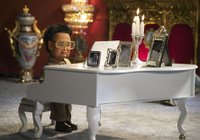...I noted a particularly patriotic Chevy Truck commercial, in which John Mellencamp croons "This is our country" while a montage of iconic subjects like the Vietnam War, Martin Luther King, Rosa Parks, and 9/11 culminates in a Chevy product shot. It felt a bit manipulative and egregiously cheesy, but in the heat of the football excitement I didn't give it another thought.
Then when I got home I read this sassy send-up of the ad in The New York Times. A choice excerpt:
And now we have Mr. Mellencamp, who’s done some rebranding of his own, having dropped the “Cougar” from his name back when his image needed a folksy turn. His political values seem equally elastic. He and his spouse once wrote a jeremiad against the Bush administration that said, in part: “It is time to take back our country. Take it back from political agendas, corporate greed and overall manipulation."
That was in 2003. Now he’s sitting on the fender of a Chevy truck, strumming a guitar and singing, “Well, I can stand beside ideals I think are right, and I can stand beside the idea to stand and fight.” He can also stand beside a nice shiny truck, if the fee is right.
A few days ago, Gawker, the Manhattan media site, ran a picture of a bar advertising, “The happiest happy hour south of ground zero.” Whether or not the statement is clinically true — a bit tough to measure, that — the message was beyond crass and deserved our contempt.
When it comes to selling bars, trucks or even politicians, you can wave the flag or you can drape one over a coffin. You can’t do both.
29 October 2006
22 October 2006
U.K. tagger god Banksy's imagery...
...is always entertaining to the eyes and usually pretty thought- provoking, too. The piece below (click it to enlarge) is new on Banksy's incredible gallery-site, banksy.co.uk.
 Of many powerful images, the one I think is Banksy's most stirring - it depicts a trio of characters brought together in a scathing send-up of imperalism, militarisim, capitalism, and globalization all at once - is actually so stirring I'm hesistant to display it straight out on this page. Instead, I'll wimp out and provide a link to it here.
Of many powerful images, the one I think is Banksy's most stirring - it depicts a trio of characters brought together in a scathing send-up of imperalism, militarisim, capitalism, and globalization all at once - is actually so stirring I'm hesistant to display it straight out on this page. Instead, I'll wimp out and provide a link to it here.
 Of many powerful images, the one I think is Banksy's most stirring - it depicts a trio of characters brought together in a scathing send-up of imperalism, militarisim, capitalism, and globalization all at once - is actually so stirring I'm hesistant to display it straight out on this page. Instead, I'll wimp out and provide a link to it here.
Of many powerful images, the one I think is Banksy's most stirring - it depicts a trio of characters brought together in a scathing send-up of imperalism, militarisim, capitalism, and globalization all at once - is actually so stirring I'm hesistant to display it straight out on this page. Instead, I'll wimp out and provide a link to it here.21 October 2006
Here's a blazer from Kevin Tillman...
...a former soldier in the U.S. Army and brother of former NFL player Pat Tillman, who left football to join the Army and was killed by friendly fire in Afghanistan in 2004. Kevin seems eager for some domestic regime change on November 7. His full essay, After Pat's Birthday, was published on an outside-the-mainstream news site I hadn't heard of, truthdig.com. Kevin's background combines with the incredulous tone of his writing to give his piece significant punch:
Somehow faking character, virtue and strength is tolerated.
Somehow faking character, virtue and strength is tolerated.
Somehow profiting from tragedy and horror is tolerated.
Somehow the death of tens, if not hundreds, of thousands of people is tolerated.
Somehow subversion of the Bill of Rights and The Constitution is tolerated.
Somehow suspension of Habeas Corpus is supposed to keep this country safe.
Somehow torture is tolerated.
Somehow lying is tolerated.
Somehow reason is being discarded for faith, dogma, and nonsense.
Somehow American leadership managed to create a more dangerous world...
Somehow the same incompetent, narcissistic, virtueless, vacuous, malicious criminals are still in charge of this country.
Somehow this is tolerated.
Somehow nobody is accountable for this.
Full essay here, on truthdig.com.
13 October 2006
A temblor of globalization is rumbling...
...in China, where the central government - worried about a widening income gap and the related potential for civil unrest - is working to establish more comprehensive rights for workers in the nation's rapidly growing economy. Economists like Pietra Rivoli, author of the suberb Travels of a T-Shirt in the Global Economy, argue that China's push for labor protections is a natural evolution in the process of globalization.
Rivoli believes that labor forces in developing economies like China's, originally tapped by foreign employers because of their willingness to work for next to nothing, become more skilled and more wealthy over time. As their economic status improves, these workers will begin to clamor for more raises and workplace reforms, in effect seeking to close the gap between themselves and the workers of more developed nations. Employers must accomodate these demands or move on to a less-developed economy, where the process will start anew.
A shorter-term option for employers, of course, is to rally against raises and reforms for as long as possible. China's current push for labor rights, for example, is staunchly opposed by the U.S. Chamber of Commerce, which represents companies like Dell, Ford, GE, and Nike. While foes of globalization might interpret this as evidence of the developed world's exploitative aims, I think Rivoli would disagree. She would probably argue that, while both sides of the issue should be expected to fight for their interests, history suggests the Chinese worker will end up better off - and in the long run, the rest of us will, too.
For more on China's push for labor rights, check this NY Times article.
Rivoli believes that labor forces in developing economies like China's, originally tapped by foreign employers because of their willingness to work for next to nothing, become more skilled and more wealthy over time. As their economic status improves, these workers will begin to clamor for more raises and workplace reforms, in effect seeking to close the gap between themselves and the workers of more developed nations. Employers must accomodate these demands or move on to a less-developed economy, where the process will start anew.
A shorter-term option for employers, of course, is to rally against raises and reforms for as long as possible. China's current push for labor rights, for example, is staunchly opposed by the U.S. Chamber of Commerce, which represents companies like Dell, Ford, GE, and Nike. While foes of globalization might interpret this as evidence of the developed world's exploitative aims, I think Rivoli would disagree. She would probably argue that, while both sides of the issue should be expected to fight for their interests, history suggests the Chinese worker will end up better off - and in the long run, the rest of us will, too.
For more on China's push for labor rights, check this NY Times article.
10 October 2006
Hush, and enjoy the elocution...
"You know, one of the hardest parts of my job is to connect Iraq to the war on terror." --George W. Bush, interview with CBS News' Katie Couric, Sept. 6, 2006
"The United States of America is engaged in a war against an extremist group of folks." --George W. Bush, McLean, Va., Aug. 15, 2006
"One thing is clear, is relations between America and Russia are good, and they're important that they be good." --George W. Bush, Strelna, Russia, July 15, 2006
"You never know what your history is going to be like until long after you're gone." --George W. Bush, Washington, D.C., May 5, 2006

"The United States of America is engaged in a war against an extremist group of folks." --George W. Bush, McLean, Va., Aug. 15, 2006
"One thing is clear, is relations between America and Russia are good, and they're important that they be good." --George W. Bush, Strelna, Russia, July 15, 2006
"You never know what your history is going to be like until long after you're gone." --George W. Bush, Washington, D.C., May 5, 2006

09 October 2006
While the NLRB slips it past us at home...
...North Korea has gone completely il (not the good ill often cited by the Beastie Boys) with this nuclear test ridiculousness. It's like I've seen this before, in a horrible dream - no wait, it was Team America World Police.
Is it a coincidence that a new prime minister with tough guy foreign policy beliefs just stepped in for Japan? It's hard to figure out what the hell is going on, but in any case, and particularly in Bush's case, ugh. Clinton's style was to engage in diplomacy, and it seemed to keep this sticky stuff down. You know what happens when il gets lonely...

Is it a coincidence that a new prime minister with tough guy foreign policy beliefs just stepped in for Japan? It's hard to figure out what the hell is going on, but in any case, and particularly in Bush's case, ugh. Clinton's style was to engage in diplomacy, and it seemed to keep this sticky stuff down. You know what happens when il gets lonely...

06 October 2006
Paul Krugman on a recent NLRB decision...
...which represents a big blow to workers' rights. Full article here, on a site that gets around the NY Times "Select" barrier that now guards Krugman's awesome columns.
Since 1935, U.S. workers considering whether to join a union have been protected by the National Labor Relations Act... For a long time the law was effective: workers were reasonably well protected against employer intimidation, and the union movement flourished.
In the 1970’s, however, employers began a successful campaign to roll back unions. ... thanks to America’s political shift to the right. And now that the shift to the right has gone even further, political appointees are seeking to remove whatever protection for workers’ rights that the labor relations law still provides.
The Republican majority on the National Labor Relations Board ... has just declared that millions of workers who thought they had the right to join unions don’t. You see, the act grants that right only to workers who aren’t supervisors. And the board, ruling on a case involving nurses, has declared that millions of workers who occasionally give other workers instructions can now be considered supervisors.
As the dissent from the Democrats on the board makes clear, the majority bent over backward, violating the spirit of the law, to reduce workers’ bargaining power.
Since 1935, U.S. workers considering whether to join a union have been protected by the National Labor Relations Act... For a long time the law was effective: workers were reasonably well protected against employer intimidation, and the union movement flourished.
In the 1970’s, however, employers began a successful campaign to roll back unions. ... thanks to America’s political shift to the right. And now that the shift to the right has gone even further, political appointees are seeking to remove whatever protection for workers’ rights that the labor relations law still provides.
The Republican majority on the National Labor Relations Board ... has just declared that millions of workers who thought they had the right to join unions don’t. You see, the act grants that right only to workers who aren’t supervisors. And the board, ruling on a case involving nurses, has declared that millions of workers who occasionally give other workers instructions can now be considered supervisors.
As the dissent from the Democrats on the board makes clear, the majority bent over backward, violating the spirit of the law, to reduce workers’ bargaining power.
Subscribe to:
Comments (Atom)
